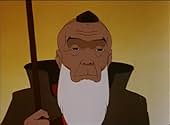Among the aged master painter Wang-Fô's impeccable paintings, exists a mediocre and unflattering portrait of the pale Celestial Emperor that has merited him execution, nevertheless, how is t... Read allAmong the aged master painter Wang-Fô's impeccable paintings, exists a mediocre and unflattering portrait of the pale Celestial Emperor that has merited him execution, nevertheless, how is this possible?Among the aged master painter Wang-Fô's impeccable paintings, exists a mediocre and unflattering portrait of the pale Celestial Emperor that has merited him execution, nevertheless, how is this possible?
- Director
- Writers
- Stars
- Ling
- (voice)
- Director
- Writers
- All cast & crew
- Production, box office & more at IMDbPro
Featured reviews
In it we have Wang-Fo, a supreme master of painting in medieval China. Reality is portrayed in his paintings even more beautifully than it actually is, in fact once one has seen the work of Wang-Fo, one scorns reality. In one part he paints the narrator's wife, who then falls out of love with her and in love with her portrayal in the paintings. One's glee is aroused when one realises the reflexivity involved. You are yourself witnessing animation that is so good that you are in danger of falling out with reality yourself (especially as regards the unreal landscapes in the film, highly influenced by Oriental art).
Without wishing to give away the plot too much I will say that Wang-Fo's skill incurs the Emperor's displeasure. His work is portrayed as being tantamount to sacrilegious because of its tendency to diminish reality. The Emperor orders Wang-Fo's mutilation, and it is how he is saved (the title points to this being the key to the riddle) that really makes the movie transcendent.
What makes me happiest about this movie though is the profound sense of ambivalence engendered. One feels both sides of the argument, that great art is at once transcendent and a perversion. Is Wang-Fo a criminal or an angel (and there are certainly parts where his skill is portrayed as very sinister)? This is a topic that has always fascinated me, having always buried myself in books and images and ideas, steadfastly avoiding subsequently dimmed reality.
Henry Fuseli, a painter of Gothic fantasy commented (to misquote him from memory) that the lover of fantasy will forever be disappointed by reality. Laloux leaves the viewer room to make up their own mind about whether such decadence is worth the price it demands.
This animated short based on a short story by Yourcenar, itself taken from Lafcadio Hearne who retold a tale of more ancient origin, was apparently considered by Laloux to be his finest work.
This both celebrates the power of art, while questioning that power. Wang-Fo creates images of extreme beauty but they ultimately leave devastation in the real world. The art work in this feature is very nice, the back drops in particular are stunning; they resemble traditional Japanese landscape art themselves. The tone is reflective, while the ending is very poetic. This is certainly a lovely feature.
Did you know
- TriviaBased on a short story by Marguerite Yourcenar from the collection "Oriental Tales".
- Quotes
L'empereur: You ask me what you have done, Wang-Fô. As others' poison finds its way into us through our nine openings, to confront you with the wrongs you have done, I have to tell you my life story.
Details
- Release date
- Country of origin
- Language
- Also known as
- How Wang-Fo Was Saved
- Production company
- See more company credits at IMDbPro
- Runtime15 minutes
- Color
- Aspect ratio
- 1.37 : 1
Contribute to this page















